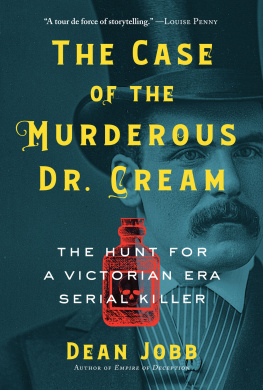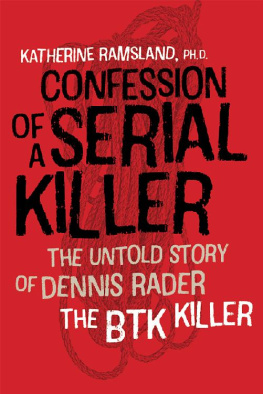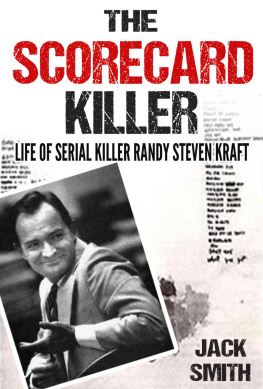Giorgio Faletti graduated with a degree in Law and went on to become a singer-songwriter, TV comedian and actor.
I Kill was his first thriller. Published in 2002, it topped the bestseller lists for over a year. The novel has since been translated into twenty-five languages, including Chinese, French, German, Japanese, Portuguese, Russian and Spanish.
In 2004, he published his second novel Niente di vero tranne gli occhi and in 2006 he released his third thriller Fuori da un evidente destino, all of which have been bestsellers.
I Kill
Giorgio Faletti

Constable & Robinson Ltd
3 The Lanchesters
162 Fulham Palace Road
London W6 9ER
www.constablerobinson.com
Editorial team of the English language edition: Antony Shugaar, Muriel Jorgensen, Lenore Rosenberg, Jeremy Parzen.
First published in Italy by Baldini & Castoldi as Io uccido in 2002
This edition published by Corsair,
an imprint of Constable & Robinson, 2010
Copyright 2002 Giorgio Faletti
Copyright 2002 Baldini & Castoldi
Copyright 2003 Baldini Castoldi Dalai editore
Copyright 2008 Baldini Castoldi Dalai editore Inc.
The right of Giorgio Faletti to be identified as the author of this work has been asserted by him in accordance with the Copyright, Designs & Patents Act 1988.
All rights reserved. This book is sold subject to the condition that it shall not, by way of trade or otherwise, be lent, re-sold, hired out or otherwise circulated in any form of binding or cover other than that in which it is published and without a similar condition including this condition being imposed on the subsequent purchaser.
A copy of the British Library Cataloguing in Publication
Data is available from the British Library
ISBN 978-1-84901-295-9
Printed and bound in the EU
1 3 5 7 9 10 8 6 4 2
CONTENTS
To Davide and Margherita
Death walks along a street, Wreathed in faded orange blossoms Singing and singing A song To a white guitar Singing and singing and singing. Frederico Garca Lorca |
FIRST CARNIVAL
The man is one and no one.
For years, he has worn his face as a mask, a mere shadow of himself. He is so wiped out by tiredness that he has almost lost his sanity.
There is music, bodies moving. People smiling and talking. The man stands amongst them, leaning against a column as he watches curiously. He thinks that every last one of these people is useless.
He is surrounded by endless faces, people who do not question; people who passively accept their lives and never admit to the boredom and pain of the journey.
At the far side of the room, a man and a woman are sitting next to each other at a table overlooking the garden.
In the soft light she appears as delicate and tender as melancholy. She has black hair and green eyes, so luminous and large that even from where he stands the man can see into them. Her companion is conscious of nothing but her beauty. He whispers into her ear to make himself heard over the blaring music.
They are holding hands and she is laughing, throwing back her head or hiding her face against his shoulder.
Just a moment ago, she turned and looked around, perhaps aware of the fixed stare coming from the man across the room. Their eyes met for an instant, but hers passed indifferently over his face. And then those incredible eyes came to rest once more on the man next to her. He returns her gaze.
They are young, beautiful and happy.
The man leans against the column, thinking that soon they will be dead.
ONE
Jean-Loup Verdier pressed the button on the remote, but only started his car when the garage door was halfway up, so as not to breathe too much exhaust. His headlights cut slowly beneath the door and out into the black night. He slipped the automatic transmission into DRIVE and slowly rolled his Mercedes SLK outside. He pressed the CLOSE button and sat taking in the view from his house as he waited for the door to shut behind him.
Monte Carlo looked like a bed of concrete by the sea, the city enveloped in the soft evening haze. Not far below him, in French territory, the lights of the country-club tennis courts, where some international star was probably practising, gleamed next to the skyscraper of the Parc Saint-Roman. Lower down, below the old city fortress towards Cap dAil, he could make out the neighbourhood of Fontvieille that had been reclaimed from the water, yard by yard, stone by stone.
He lit a cigarette and switched on the car radio, already tuned to Radio Monte Carlo, as he opened the remote-controlled gate and ascended the ramp to street level. He turned left and slowly drove towards the city, enjoying the warm air of late May.
Pride by U2 was on the radio, and Jean-Loup smiled with recognition at the bands unmistakable guitar riffs.
Stefania Vassallo, the shows deejay, was crazy about U2s lead guitarist, The Edge, and she never let a show go by without playing one of the bands songs. Her colleagues at the station made fun of her because of the dreamy expression she wore for months after she got an interview with her idols.
As he drove along the winding road that led from Beausoleil to the city centre, Jean-Loup tapped his foot in time with the music. Marking the upbeat with his right hand on the steering wheel, he followed along as Bonos rusty, melancholy voice sang of a man who came in the name of love.
Summer was in the air, and that unique smell one finds only in cities by the sea. An odour of brackish water, pine trees and rosemary. The scent of broken promises and lost bets.
All of it the sea, the trees, the flowers would still be there long after he and all the others like him had hurried by.
He drove his convertible with the top down, the warm wind in his hair. Promise filled his heart. Hed placed his bets in life.
Things could be worse.
It wasnt late, but the road was empty. He flicked his cigarette into the rushing air, watching the bright curve it made in his rearview mirror. As it hit the asphalt it scattered in a blaze of tiny sparks, the last puff of smoke disappearing in the darkness. Jean-Loup reached the bottom of the hill and hesitated, then, deciding to take the city-centre route to the harbour he turned down Boulevard dItalie.
Tourists were beginning to crowd into the Principality. The Formula 1 Grand Prix, which had just ended, meant the beginning of summer in Monaco. From now on, the city would be bustling with actors and spectators day and night. There would be chauffeured limousines with privileged and bored people inside. There would be small cars with sweaty passengers adoring the sights, like those who stand in front of shop windows wondering when theyd find the time to come back and buy that jacket, others where theyd find the money. Things were black and white two extremes with shades of grey in between.
Jean-Loup thought that the priorities of life, in the end, were simple and repetitive, and in places like Monte Carlo they could be counted on one hand. Money came first. Some have it and the rest want it. Simple. A clich becomes a clich because it has some truth. Money might not buy happiness, but that didnt seem to bother anyone.
The mobile in his shirt pocket chirped. He pulled it out and answered without looking at the callers name: he knew who it was. The voice of Laurent Bedon, the director and writer of Voices, the programme that Jean-Loup hosted on Radio Monte Carlo every night, crackled in his ear in a haze of static.
Any chance the star will grace us with his presence tonight?
Next page







